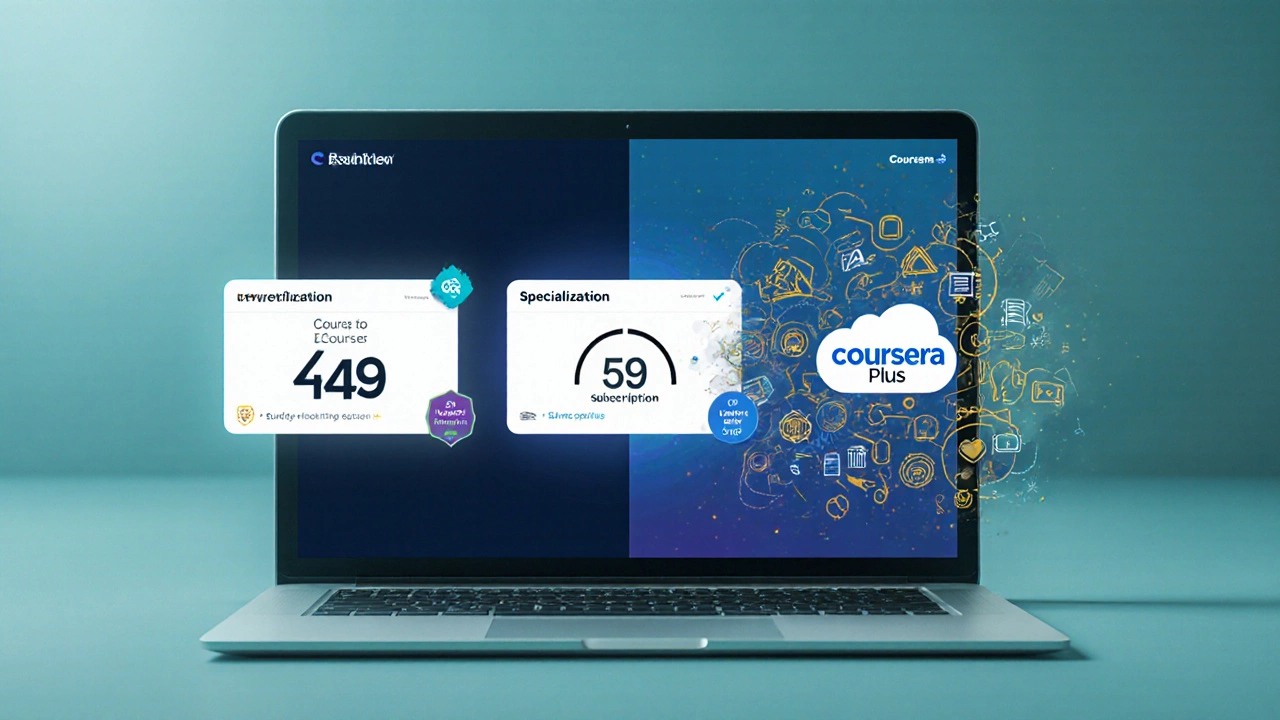Coursera Cost Calculator
Compare Your Learning Plan
Calculate which Coursera option saves you money based on your goals
Results
Which Option is Best?
If you're wondering how much Coursera costs per month, you're not alone. Thousands of people sign up every week hoping to learn new skills, earn certifications, or even advance their careers - but they want to know what they’re really paying for. The short answer? Coursera doesn’t have one flat monthly price. What you pay depends on what you’re taking, how you’re accessing it, and whether you’re paying per course or subscribing.
Coursera’s Pricing Models Explained
Coursera offers three main ways to pay: single courses, Specializations, and a monthly subscription called Coursera Plus. Each has different costs and benefits.
If you just want to take one course - say, Google Data Analytics Professional Certificate or Python for Everybody - you can pay for it individually. Most individual courses cost between $39 and $79. Some, especially those from top universities like Stanford or Yale, can go up to $100. You pay once, get lifetime access to the course materials, and earn a certificate if you finish.
But most people don’t stop at one course. That’s where Specializations come in. These are groups of 4-10 courses built around a skill, like project management, digital marketing, or machine learning. A Specialization usually costs $39 to $79 per month, billed monthly until you complete it. You can cancel anytime. Most people finish a Specialization in 3-6 months, so the total cost is often between $150 and $400.
Then there’s Coursera Plus. This is their all-you-can-eat plan. For $59 per month (billed monthly), or $399 per year (which works out to about $33/month), you get unlimited access to over 7,000 courses, 4,500 Specializations, and 1,000 Professional Certificates. That includes everything from IT support to data science to leadership training. If you plan to take more than two courses or one Specialization in a year, Coursera Plus pays for itself.
What You Actually Get for Your Money
When you pay for a course or Specialization, you’re not just getting videos. You’re getting graded assignments, quizzes, peer-reviewed projects, and a verifiable certificate you can add to LinkedIn or your resume. Many courses also include access to industry tools - like Tableau, SQL databases, or Excel templates - so you’re not just learning theory.
For example, the IBM Data Analyst Professional Certificate includes hands-on labs using IBM’s Watson Studio and real-world datasets. The Meta Social Media Marketing Certificate teaches you how to run ad campaigns on Facebook and Instagram using their actual ad manager platform. These aren’t just lectures - they’re job-ready training.
And here’s something most people don’t realize: Coursera partners with over 300 universities and companies, including Google, IBM, Amazon, and the University of London. That means the content is designed with real industry needs in mind, not just academic theory.
Free Options - Yes, They Exist
You can audit most courses for free. That means you can watch all the videos, read the materials, and even take quizzes - but you won’t get graded feedback or a certificate. If you’re just curious or want to test a topic before paying, auditing is a great way to start.
Some courses also offer financial aid. If you can’t afford the fee, you can apply for it directly on the course page. Coursera says they approve about 90% of applications. You just need to explain why you need help and how you’ll use the learning. No credit check. No paperwork. Just a short form.
There are also free courses with certificates. For example, the Introduction to Psychology course from Yale and Learning How to Learn from McMaster University are completely free - including the certificate - if you enroll in the audit track. These are often the most popular courses on the platform.

Coursera Plus: Is It Worth It?
Let’s say you’re a marketing professional trying to learn SEO, Google Analytics, and content strategy. Without Coursera Plus, you’d pay $177 for three separate Specializations. With Coursera Plus, you get all of them - plus 500+ other courses - for $399 a year. That’s less than $34 a month.
Or imagine you’re switching careers into tech. You want to learn Python, SQL, data visualization, and SQL for data analysis. That’s four Specializations. At $60 each, that’s $240. With Coursera Plus, you get them all plus access to future courses as they launch. You’re not locked in. You can switch paths anytime.
For learners who are serious about building skills over time, Coursera Plus is the smartest option. It removes the guesswork and the sticker shock of paying for each course separately.
Hidden Costs and What’s Not Included
There are no hidden fees for the courses themselves. But some Professional Certificates - like those in IT or cybersecurity - may require you to pay for third-party certification exams separately. For example, the Google IT Support Professional Certificate prepares you for the CompTIA A+ exam, which costs $246. That’s not included in your Coursera fee.
Also, while you get unlimited access to course materials with Coursera Plus, you don’t get one-on-one coaching, tutoring, or direct access to professors. You’ll interact with peers and automated feedback systems, not live instructors.
And while certificates are recognized by employers, they’re not degrees. Coursera doesn’t grant academic credit unless you enroll in a degree program - which is a separate, much more expensive path.
Who Should Pay Monthly? Who Should Pay Per Course?
If you’re learning one thing - like Excel for finance or a single programming language - and you’re done after that, pay per course. It’s cheaper and more focused.
If you’re building a skill set over months or years - say, becoming a data analyst, UX designer, or project manager - then Coursera Plus is the better deal. You’ll save money, stay motivated with variety, and keep learning as your goals evolve.
Students, job seekers, and career changers benefit most from the subscription. Busy professionals who want to upskill during lunch breaks or after work also find the monthly plan easier to manage.
Real-World Example: A Month on Coursera
Let’s say you’re a 28-year-old working in retail customer service in Auckland. You want to move into digital marketing. In one month, you could:
- Take the free Google Digital Garage course to get started
- Enroll in the Meta Social Media Marketing Certificate (billed monthly at $49)
- Start auditing the Introduction to Marketing Analytics course from the University of Illinois
By the end of the month, you’ve got three certificates on your LinkedIn profile, hands-on experience with Facebook Ads Manager, and a better understanding of how to track campaign performance. That’s not just learning - that’s career momentum.
Final Thoughts: What’s the Real Monthly Cost?
There’s no single answer to “How much is Coursera a month?” because it depends on your goals.
If you’re just exploring, it’s free.
If you’re taking one course, it’s $40-$80 one-time.
If you’re building a career, it’s $33-$59 a month with Coursera Plus.
The platform works best when you treat it like a gym membership - not a one-time purchase. The more you use it, the more value you get. And unlike a gym, you’re not just sweating - you’re building skills that can change your income, your job, or even your life.
Is Coursera free to use?
Yes, you can audit most courses for free. That means you can watch videos and read materials without paying. But you won’t get graded assignments, feedback, or a certificate. To earn a certificate, you need to pay for the course or subscribe to Coursera Plus.
How much does Coursera Plus cost?
Coursera Plus costs $59 per month if billed monthly, or $399 per year (about $33 per month). With this plan, you get unlimited access to over 7,000 courses, 4,500 Specializations, and 1,000 Professional Certificates. It’s the best deal if you plan to take more than two courses in a year.
Can I get a refund if I don’t like a course?
Yes. Coursera offers a 7-day free trial for paid courses and Specializations. If you cancel within that time, you won’t be charged. For Coursera Plus, you can cancel anytime and keep access until the end of your billing period. No questions asked.
Do Coursera certificates help get a job?
Yes. Many employers recognize Coursera certificates, especially those from Google, IBM, Meta, and top universities. A 2024 LinkedIn survey found that 72% of hiring managers view online certificates from platforms like Coursera as valuable. Certificates in high-demand fields like data analysis, cloud computing, and digital marketing can significantly improve your chances of landing interviews.
Are Coursera certificates equivalent to a degree?
No. Coursera certificates are not degrees. They’re professional credentials that show you’ve completed specific training. However, some universities offer full online degrees through Coursera - like a Master’s in Computer Science from the University of Illinois - and those are accredited and carry academic credit. Those cost thousands of dollars and are separate from regular courses.
Can I cancel my Coursera subscription anytime?
Yes. You can cancel your Coursera Plus subscription at any time through your account settings. You’ll keep access until the end of your current billing cycle. There’s no penalty, and you won’t be charged again after cancellation.
What’s the difference between a course and a Specialization?
A course is a single learning module - like “Introduction to Python” - usually lasting 4-8 weeks. A Specialization is a series of 4-10 related courses that build a complete skill set - like “Data Analysis with Python.” Completing a Specialization gives you one comprehensive certificate instead of multiple small ones.

